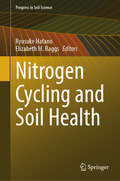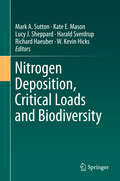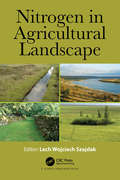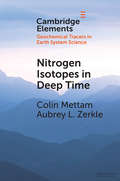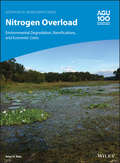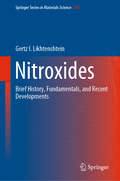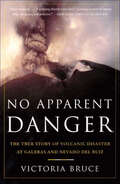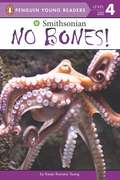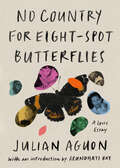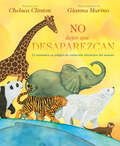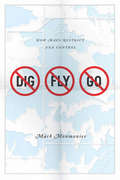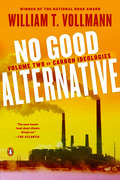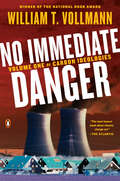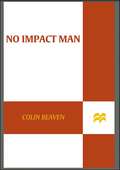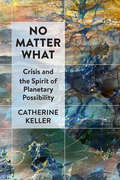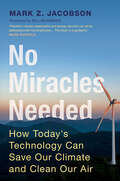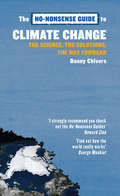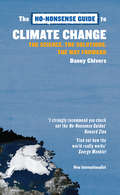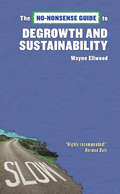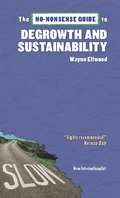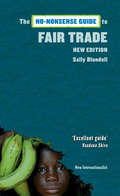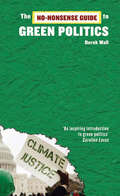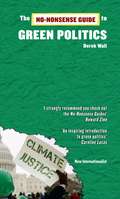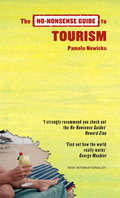- Table View
- List View
Nitrogen Cycling and Soil Health (Progress in Soil Science)
by Ryusuke Hatano Elizabeth M. BaggsThe United States Department of Agriculture (USDA) defines soil health as the continued capacity of soil to function as a vital living ecosystem that sustains plants, animals, and humans, and healthy soil gives us clean air and water. Nitrogen is indispensable to support life on earth, including for food production, but it also causes environmental problems such as global warming and groundwater pollution. This book brings together novel aspects of soil nitrogen research that solve these problems, with a particular focus on soil health in intensive agricultural systems. The two main sections are: 1) Monitoring and understanding of soil nitrogen transformations to maintain soil health, and 2) Soil nitrogen management for soil health. Included topics are regulation of key nitrogen loads and processes such as nitrous oxide emissions, nitrate leaching, ammonia volatilization, denitrification, nitrogen fixation, nitrification, mineralization, their relationships with the soil microbial biomass, and impact of soil management practices for enhanced soil health and sustainability. This book includes selected papers presented at the symposium Nitrogen Cycling and Soil Health at the 2022 World Congress of Soil Science, which took place in Glasgow, U.K.
Nitrogen Deposition, Critical Loads and Biodiversity
by Mark A. Sutton Kate E. Mason Lucy J. Sheppard Harald Sverdrup Richard Haeuber W. Kevin HicksThis volume brings together extended reviews and papers of new scientific research on atmospheric nitrogen deposition impacts globally. While there is a wealth of evidence on the magnitude, components and effects of nitrogen disposition on floral biodiversity in Europe and North America, there is an obvious lack of information on impacts on above- and below-ground fauna, and all impacts in other parts of the world, with no clear overview of how the different strands of evidence fit together. This overall synthesis is targeted at the international conventions, but is equally readable for scientists, environmental managers, conservation agencies and policy makers. 'This timely book highlights the global nitrogen deposition problem. Major regions of the world are exceeding sustainability thresholds for adverse effects on ecosystem function and biodiversity. This highlights the importance of ongoing work, including under the Convention on Biological Diversity, in developing indicators and monitoring nitrogen deposition effects to enable appropriate measures. This book presents a milestone towards this global goal as the international community works toward meeting the Aichi Biodiversity Targets, especially Target 8: "By 2020, pollution, including from excess nutrients, has been brought to levels that are not detrimental to ecosystem function and biodiversity". Braulio Ferreira de Souza Dias, Executive Secretary, Convention on Biological Diversity "This key volume highlights the global challenge to reduce atmospheric nitrogen pollution resulting from energy production, transport and agricultural activities. It takes forward the agenda recently launched in the UNEP commissioned report 'Our Nutrient World". Dr. Anjan Datta, UNEP.
Nitrogen in Agricultural Landscape
by Lech Wojciech SzajdakAgriculture transforms the environment. The simplification of agroecosystems structure increases the hazards of leaching, wind and water erosion, and volatilization of chemicals from soil. Soil nitrogen is of interest as a major crop nutrient, but also as a potential environmental pollutant. Knowledge about the behavior of soil nitrogen is desirable in order to optimize plant growth and crop yield and to minimize environmental side effects. This book also gives information about the function of biogeochemical barriers in the form of shelterbelts, which efficiently decrease the concentrations of various forms of nitrogen in ground water.
Nitrogen Isotopes in Deep Time (Elements in Geochemical Tracers in Earth System Science)
by Colin Mettam Aubrey L. ZerkleNitrogen is an essential nutrient for life, and its sources and cycling have varied over earth history. Stable isotope ratios of nitrogen compounds (expressed as δ15N, in ‰) are preserved in the sedimentary record and track these changes, providing important insights into associated biogeochemical feedbacks. Here we review the use of nitrogen stable isotope geochemistry in unravelling the evolution of the global N cycle in deep time. We highlight difficulties with preservation, unambiguous interpretations, and local versus global effects. We end with several case studies illustrating how depositional and stratigraphic context is crucial in reliably interpreting δ15N records in ancient marine sediments, both in ancient anoxic (Archean) and more recent well oxygenated (Phanerozoic) environments.
Nitrogen Overload: Environmental Degradation, Ramifications, and Economic Costs (Geophysical Monograph Series #251)
by Brian G. KatzAn integrated approach to understanding and mitigating the problem of excess nitrogen Human activities generate large amounts of excess nitrogen, which has dramatically altered the nitrogen cycle. Reactive forms of nitrogen, especially nitrate and ammonia, are particularly detrimental. Given the magnitude of the problem, there is an urgent need for information on reactive nitrogen and its effective management. Nitrogen Overload: Environmental Degradation, Ramifications, and Economic Costs presents an integrated, multidisciplinary review of alterations to the nitrogen cycle over the past century and the wide-ranging consequences of nitrogen-based pollution, especially to aquatic ecosystems and human health.
Nitroxides: Brief History, Fundamentals, and Recent Developments (Springer Series in Materials Science #292)
by Gertz I. LikhtenshteinWritten by a pioneer in the development of spin labeling in biophysics, this expert book covers the fundamentals of nitroxide spin labeling through cutting-edge applications in chemistry, physics, materials science, molecular biology, and biomedicine. Nitroxides have earned their place as one of the most popular organic paramagnets due to their suitability as inhibitors of oxidative processes, as a means to polarize magnetic nuclei, and, in molecular biology, as probes and labels to understand molecular structures and dynamics AS DRAGS FOR CANCER AND OTHER DISEASES. Beginning with an overview of the basic methodology and nitroxides’ 145-year history, this book equips students with necessary background and techniques to undertake original research and industry work in this growing field.
No Apparent Danger: The True Story of Volcanic Disaster at Galeras and Nevado Del Ruiz
by Victoria Bruce“Heart-stopping. . . . A gripping disaster story [and] a scathing account of human folly, arrogance and ambition.” –The New York Times Book ReviewOn January 14, 1993, a team of scientists descended into the crater of Galeras, an Andean volcano in Colombia, for a day of field research. As the group slowly moved toward the heart of the volcano, Galeras erupted. Nine men died instantly.Colombian geologist Marta Calvache raced into the rumbling crater, praying to find survivors. This was Calvache’s second volcanic disaster. In 1985 Calvache was part of a group of Colombia’s brightest young scientists that had been studying Nevado del Ruiz, a volcano three hundred miles north of Galeras. When Nevado del Ruiz erupted suddenly in November 1985, it killed more than twenty-three thousand people—one of the worst natural disasters of the twentieth century.In the aftermath of Nevado del Ruiz, volcanologists from all over the world came to Galeras to better understand the behavior of monumental forces at work deep within the earth. And yet, despite such expertise, fifteen people descended into a death trap at Galeras. Victoria Bruce weaves together the stories of the heroes, victims, survivors, and bystanders, evoking with great sensitivity what it means to live in the shadow of a volcano, and shows how clashing cultures and scientific arrogance resulted in tragedy. “Spellbinding.” —Publishers Weekly“A scientific thriller [that] shows how natural disasters are also the work of men.” —Boston Globe“A vivid account.” —Time Magazine“Impossible to put down.” —Sebastian Junger, #1 New York Times–bestselling author of The Perfect Storm
No Bones!
by Karen Romano Young"Octopuses, clams, sea worms, even coral- they're all marine invertebrates. Having no internal skeleton gives them an interesting shape-not to mention unusual ways of moving around, getting food, and protecting themselves. Fascinating underwater photography and lively, accessible text draw kids into the watery world of these cool ocean creatures. "
No Country for Eight-Spot Butterflies: A Lyric Essay
by Julian Aguon"Aguon&’s book is for everyone, but he challenges history by placing indigenous consciousness at the center of his project . . . the most tender polemic I&’ve ever read." —Lenika Cruz, The Atlantic"It's clear [Aguon] poured his whole heart into this slim book . . . [his] sense of hope, fierce determination, and love for his people and culture permeates every page." —Laura Sackton, BookRiotPart memoir, part manifesto, Chamorro climate activist Julian Aguon&’s No Country for Eight-Spot Butterflies is a collection of essays on resistance, resilience, and collective power in the age of climate disaster; and a call for justice—for everyone, but in particular, for Indigenous peoples.In bracing poetry and compelling prose, Aguon weaves together stories from his childhood in the villages of Guam with searing political commentary about matters ranging from nuclear weapons to global warming. Undertaking the work of bearing witness, wrestling with the most pressing questions of the modern day, and reckoning with the challenge of truth-telling in an era of rampant obfuscation, he culls from his own life experiences—from losing his father to pancreatic cancer to working for Mother Teresa to an edifying chance encounter with Sherman Alexie—to illuminate a collective path out of the darkness.A powerful, bold, new voice writing at the intersection of Indigenous rights and environmental justice, Julian Aguon is entrenched in the struggles of the people of the Pacific to liberate themselves from colonial rule, defend their sacred sites, and obtain justice for generations of harm. In No Country for Eight-Spot Butterflies, Aguon shares his wisdom and reflections on love, grief, joy, and triumph and extends an offer to join him in a hard-earned hope for a better world.
No Dejes Que Desaparezcan
by Chelsea Clinton¿Sabías que las ballenas azules son los animales más grandes de nuestro planeta?¿O que las nutrias marinas se asean las patas después de cada comida?El mundo está lleno de millones de especies animales, y cada una de ellas es única y especial. Muchas están llamadas a desaparecer. En este libro, Chelsea Clinton les presenta a los pequeños lectores algunos de los animales en peligro de extinción, explicándoles por qué son únicos y especiales y qué clase de peligros corren. No dejes que desaparezcan conduce al lector a lo largo de un día en la vida de rinocerontes, tigres, ballenas, pandas y otros animales, a la vez que nos ofrece consejos e ideas útiles de lo que todos podemos hacer para evitar que estos animales desaparezcan completamente de nuestro mundo.Ilustrado con las cálidas y llamativas ilustraciones de Gianna Marino, este libro es ideal para los amantes de los animales y para todas las personas que se preocupan por nuestro planeta.
No Dig, No Fly, No Go: How Maps Restrict and Control
by Mark S. MonmonierSome maps help us find our way; others restrict where we go and what we do. These maps control behavior, regulating activities from flying to fishing, prohibiting students from one part of town from being schooled on the other, and banishing certain individuals and industries to the periphery. This restrictive cartography has boomed in recent decades as governments seek regulate activities as diverse as hiking, building a residence, opening a store, locating a chemical plant, or painting your house anything but regulation colors. It is this aspect of mapping--its power to prohibit--that celebrated geographer Mark Monmonier tackles in No Dig, No Fly, No Go. Rooted in ancient Egypt's need to reestablish property boundaries following the annual retreat of the Nile's floodwaters, restrictive mapping has been indispensable in settling the American West, claiming slices of Antarctica, protecting fragile ocean fisheries, and keeping sex offenders away from playgrounds. But it has also been used for opprobrium: during one of the darkest moments in American history, cartographic exclusion orders helped send thousands of Japanese Americans to remote detention camps. Tracing the power of prohibitive mapping at multiple levels--from regional to international--and multiple dimensions--from property to cyberspace--Monmonier demonstrates how much boundaries influence our experience--from homeownership and voting to taxation and airline travel. A worthy successor to his critically acclaimed How to Lie with Maps, the book is replete with all of the hallmarks of a Monmonier classic, including the wry observations and witty humor. In the end, Monmonier looks far beyond the lines on the page to observe that mapped boundaries, however persuasive their appearance, are not always as permanent and impermeable as their cartographic lines might suggest. Written for anyone who votes, owns a home, or aspires to be an informed citizen, No Dig, No Fly, No Go will change the way we look at maps forever.
No Good Alternative: Volume Two of Carbon Ideologies
by William T. VollmannAn eye-opening look at the consequences of coal mining and oil and natural gas production--the second of a two volume work by award-winning author William T. Vollmann on the ideologies of energy production and the causes of climate changeThe second volume of William T. Vollmann's epic book about the factors and human actions that have led to global warming begins in the coal fields of West Virginia and Eastern Kentucky, where "America's best friend" is not merely a fuel, but a "heritage." Over the course of four years Vollmann finds hollowed out towns with coal-polluted streams and acidified drinking water; makes covert visits to mountaintop removal mines; and offers documented accounts of unpaid fines for federal health and safety violations and of miners who died because their bosses cut corners to make more money.To write about natural gas, Vollmann journeys to Greeley, Colorado, where he interviews anti-fracking activists, a city planner, and a homeowner with serious health issues from fracking. Turning to oil production, he speaks with, among others, the former CEO of Conoco and a vice president of the Bank of Oklahoma in charge of energy loans, and conducts furtive roadside interviews of guest workers performing oil-related contract labor in the United Arab Emirates.As with its predecessor, No Immediate Danger, this volume seeks to understand and listen, not to lay blame--except in a few corporate and political cases where outrage is clearly due. Vollmann is a carbon burner just like the rest of us; he describes and quantifies his own power use, then looks around him, trying to explain to the future why it was that we went against scientific consensus, continually increasing the demand for electric power and insisting that we had no good alternative.
No Immediate Danger: Volume One of Carbon Ideologies
by William T. VollmannA timely, eye-opening book about climate change and energy generation that focuses on the consequences of nuclear power production, from award-winning author William T. VollmannIn his nonfiction, William T. Vollmann has won acclaim as a singular voice tackling some of the most important issues of our age, from poverty to violence to the dark soul of American imperialism as it has played out on the U.S./Mexico border. Now, Vollmann turns to a topic that will define the generations to come--the factors and human actions that have led to global warming. Vollmann begins No Immediate Danger, the first volume of Carbon Ideologies, by examining and quantifying the many causes of climate change, from industrial manufacturing and agricultural practices to fossil fuel extraction, economic demand for electric power, and the justifiable yearning of people all over the world to live in comfort. Turning to nuclear power first, Vollmann then recounts multiple visits that he made at significant personal risk over the course of seven years to the contaminated no-go zones and sad ghost towns of Fukushima, Japan, beginning shortly after the tsunami and reactor meltdowns of 2011. Equipped first only with a dosimeter and then with a scintillation counter, he measured radiation and interviewed tsunami victims, nuclear evacuees, anti-nuclear organizers and pro-nuclear utility workers.Featuring Vollmann's signature wide learning, sardonic wit, and encyclopedic research, No Immediate Danger, whose title co-opts the reassuring mantra of official Japanese energy experts, builds up a powerful, sobering picture of the ongoing nightmare of Fukushima.Watch for No Good Alternative, the second volume of Carbon Ideologies, focusing on human experiences related to coal mining and oil and natural gas production - coming in June 2018.
No Impact Man: The Adventures of a Guilty Liberal Who Attempts to Save the Planet and the Discoveries He Makes About Himself and Our Way of Life in the Process
by Colin BeavanBill McKibben meets Bill Bryson in this seriously engaging look at one man's decision to put his money where his mouth is and go off the grid for one year—while still living in New York City—to see if it's possible to make no net impact on the environment.In No Impact Man, a guilty liberal finally snaps, swears off plastic, goes organic, becomes a bicycle nut, turns off his power, and generally becomes a tree-hugging lunatic who tries to save the polar bears and the rest of the planet from environmental catastrophe while dragging his baby daughter and Prada-wearing, Four Seasons–loving wife along for the ride. And that's just the beginning. In other words, no trash, no toxins in the water, no elevators, no subway, no products in packaging, no air-conditioning, no television . . .What would it be like to try to live a no-impact lifestyle? Is it possible? Could it catch on? Is living this way more satisfying or less satisfying? Harder or easier? Is it worthwhile or senseless? Are we all doomed or can our culture reduce the barriers to sustainable living so it becomes as easy as falling off a log? These are the questions at the heart of this whole mad endeavor, via which Colin Beavan hopes to explain to the rest of us how we can realistically live a more "eco-effective" and by turns more content life in an age of inconvenient truths.
No Matter What: Crisis and the Spirit of Planetary Possibility
by Catherine KellerA collection of essays that outline the recent work on ecology, political theology, religion, and philosophy by one of the leading theologians of our ageAs we face relentless ecological destruction spiraling around a planet of unconstrained capitalism and democratic failure, what matters most? How do we get our bearings and direct our priorities in such a terrestrial scenario? Species, race, sex, politics, and economics will increasingly come tangled in the catastrophic trajectory of climate change. With a sense of urgency and of possibility, Catherine Keller’s No Matter What reflects multiple trajectories of planetary crisis. They converge from a point of view formed of the political ecologies of a transdisciplinary theological pluralism. In its work an ancient symbolism of apocalypse deconstructs end-of-the-world narratives, Christian and secular, even as any notion of an all-controlling and good God collapses under the force of internal contradiction. In the place of a once-for-all incarnation, the materiality of unbounded intercarnation, of fragile yet animating relations of mattering earth-bodies, comes into focus.The essays of No Matter What share the preoccupation with matter characteristic of the so-called new materialism. They also root in an older ecotheological tradition, one that has long struggled against the undead legacy of an earth-betraying theology that, with the aid of its white Christian right wing, invests the denigration of matter, its spirit of “no matter,” in limitless commodification. The fragile alternative Keller outlines here embraces—no matter what—the mattering of the life of the Earth and of all its spirited bodies. These essays, struggling against Christian and secular betrayals of the spirited matter of Earth, work to materialize the still possible planetary healing.
No Miracles Needed: How Today's Technology Can Save Our Climate and Clean Our Air
by Mark Z. JacobsonThe world needs to turn away from fossil fuels and use clean, renewable sources of energy as soon as we can. Failure to do so will cause catastrophic climate damage sooner than you might think, leading to loss of biodiversity and economic and political instability. But all is not lost! We still have time to save the planet without resorting to 'miracle' technologies. We need to wave goodbye to outdated technologies, such as natural gas and carbon capture, and repurpose the technologies that we already have at our disposal. We can use existing technologies to harness, store, and transmit energy from wind, water, and solar sources to ensure reliable electricity, heat supplies, and energy security. Find out what you can do to improve the health, climate, and economic state of our planet. Together, we can solve the climate crisis, eliminate air pollution and safely secure energy supplies for everyone.
No Monkeys, No Chocolate
by Melissa Stewart Allen YoungEveryone loves chocolate, right? But how many people actually know where chocolate comes from? How it’s made? Or that monkeys do their part to help this delicious sweet exist?This delectable dessert comes from cocoa beans, which grow on cocoa trees in tropical rain forests. But those trees couldn’t survive without the help of a menagerie of rain forest critters: a pollen-sucking midge, an aphid-munching anole lizard, brain-eating coffin fly maggots—they all pitch in to help the cocoa tree survive. A secondary layer of text delves deeper into statements such as "Cocoa flowers can’t bloom without cocoa leaves . . . and maggots," explaining the interdependence of the plants and animals in the tropical rain forests. Two wise-cracking bookworms appear on every page, adding humor and further commentary, making this book accessible to readers of different ages and reading levels.Back matter includes information about cocoa farming and rain forest preservation, as well as an author’s note.
No-Nonsense Guide to Climate Change: The Science, the Solutions, the Way Forward (No-Nonsense Guides #3)
by Danny ChiversJust as the need for action on climate change becomes more urgent and overwhelming, the campaign to deny that humans are causing it has gained more traction. This completely new book meets the skeptics head on, offering a guide to the science, an insight into the politics of climate justice and a clear sense of the way forward. This is an ideal offering for students, academics and anyone interested in the growing issue of society’s impact on climate change and how to make climate justice a reality.
The No-Nonsense Guide to Climate Change
by Danny ChiversJust as the need for action on climate change becomes more urgent and overwhelming, the campaign to deny that humans are causing it has gained more traction. This completely new book meets the sceptics head on, offering a guide to the science, an insight into the politics of climate justice and a clear sense of the way forward.
No-Nonsense Guide to Degrowth and Sustainability
by Wayne EllwoodThe world’s addiction to economic growth continues with barely any recognition that this is a problem. Indeed, in a Western world currently dominated by austerity measures and ducking in and out of recession, growth is seen even by progressives as the only possible solution for our economic and social woes. This No-Nonsense Guide looks deeper into the idea of economic growth–to trace its history and understand why it has become so unchallengeable and powerful. And then it goes beyond that to present the alternative–how we can kick our dirty habit, how degrowth can be turned into a positive and how we can arrive at a new levels of environmental sustainability without having to turn the clock back to the Dark Ages.
The No-Nonsense Guide to Degrowth and Sustainability
by Wayne EllwoodThis guide explores the idea of economic growth, tracing its history and questioning why it has become so unchallengeable and powerful when unlimited growth in a finite world is ultimately impossible. It illustrates how economics based on degrowth can be turned into a positive and how we can arrive at new levels of environmental sustainability without having turning the clock back to the Dark Ages. A title for anyone interested in economics, the psychology of consumerism and progressive change.Wayne Ellwood is former co-editor of New Internationalist magazine. He is author of the No-Nonsense Guide to Globalization (over fifty thousand sold).
The No-Nonsense Guide to Fair Trade
by Sally BlundellAn in-depth look at two decades of a movement that aims to challenge the ethical foundations of the global market.Transnational corporations look for the cheapest suppliers, while the fair trade movement insists on a premium for the producers at the start of the chain.Sally Blundell uncovers the origins of fair trade and what it is likely to become.
No-Nonsense Guide to Green Politics (No-Nonsense Guides #13)
by Derek WallClimate chaos and pollution, deforestation and consumerism: the crisis facing human civilization is clear enough. But the response of politicians has been cowardly and inadequate, while environmental activists have tended to favour single-issue campaigns rather than electoral politics. The No-Nonsense Guide to Green Politics measures the rising tide of eco-activism and awareness and explains why this event heralds a new political era worldwide: in the near futurethere will be no other politics but green politics.
The No-Nonsense Guide to Green Politics
by Derek WallClimate chaos and pollution, deforestation and consumerism: the crisis facing human civilization is clear enough. But the response of politicians to it has been cowardly and inadequate, while environmental activists have tended to favor single-issue campaigns rather than electoral politics.The No-Nonsense Guide to Green Politics measures the rising tide of eco-activism and awareness and explains why it heralds a new political era worldwide.Derek Wall is a former principal speaker of the British Green Party. He is the author of numerous books, including Babylon and Beyond: The Economics of Anti-Capitalist, Anti-Globalist and Radical Green Movements.
The No-Nonsense Guide to Tourism
by Pamela NowickaThis guide demystifies the often invisible impacts of global tourism, one of the biggest industries in the world, from labor conditions to development by stealth, to the role of elites and the cultural impacts on both the visitor and the visited.It also takes in themes such as the gap year and the role of travel and vacations in Western cultures, and examines the "happy smiling faces" syndrome and asks whether this is just a reworking of old colonial relationships. Pamela Nowicka is a journalist and consultant writing on numerous tourism and ethics subjects.
